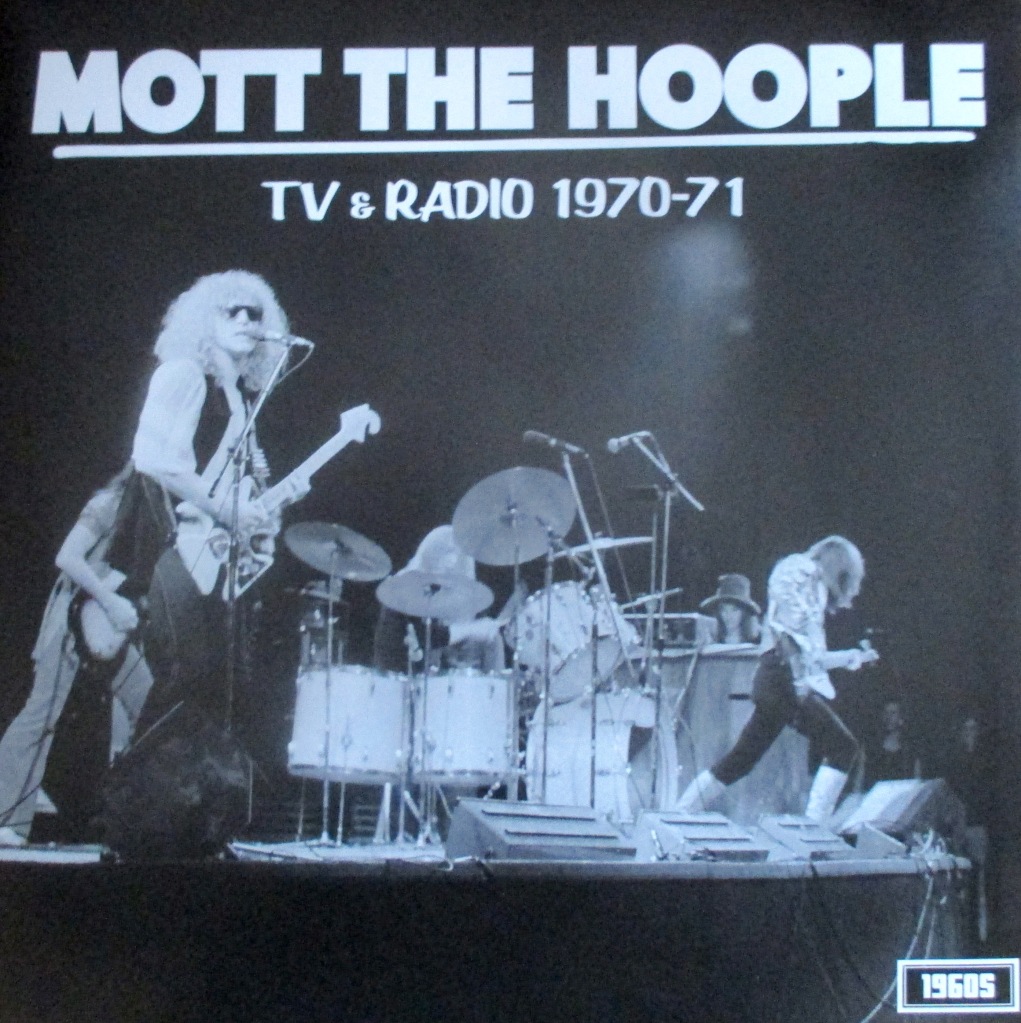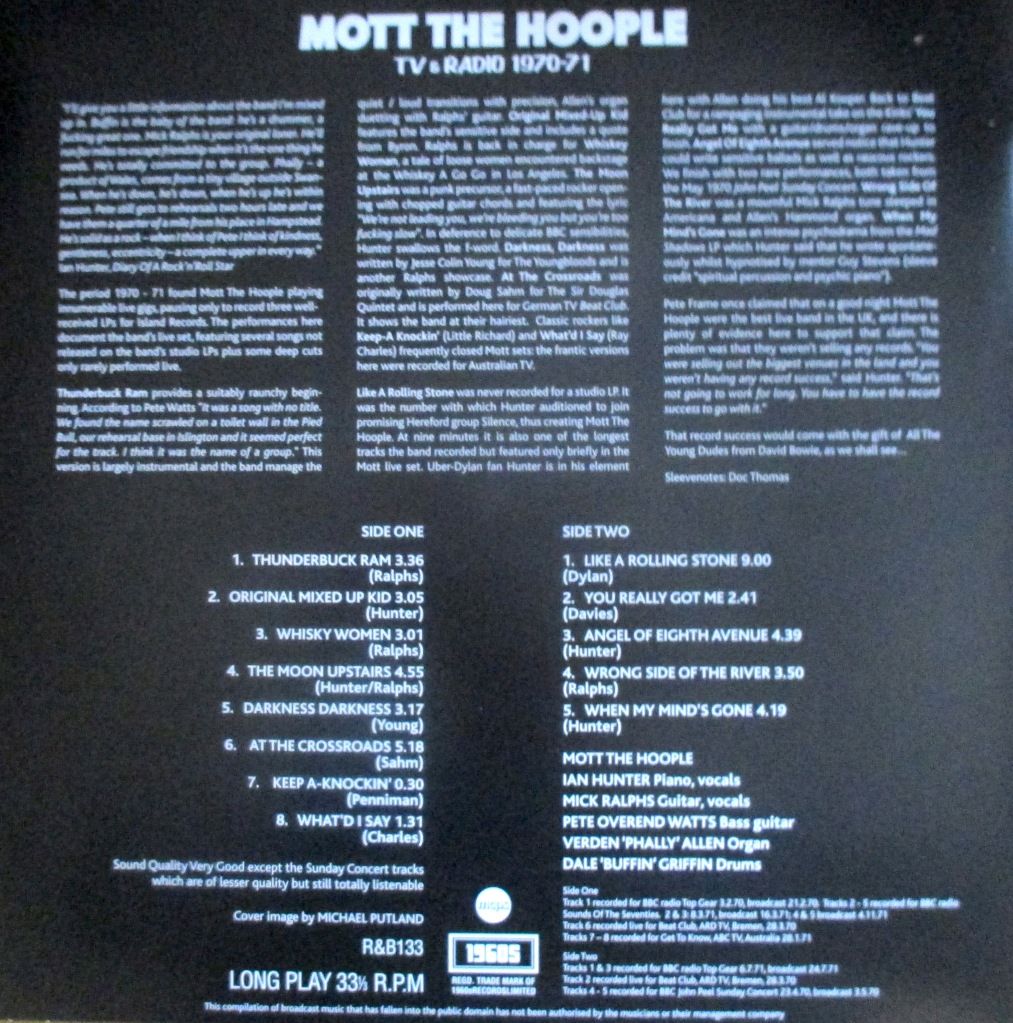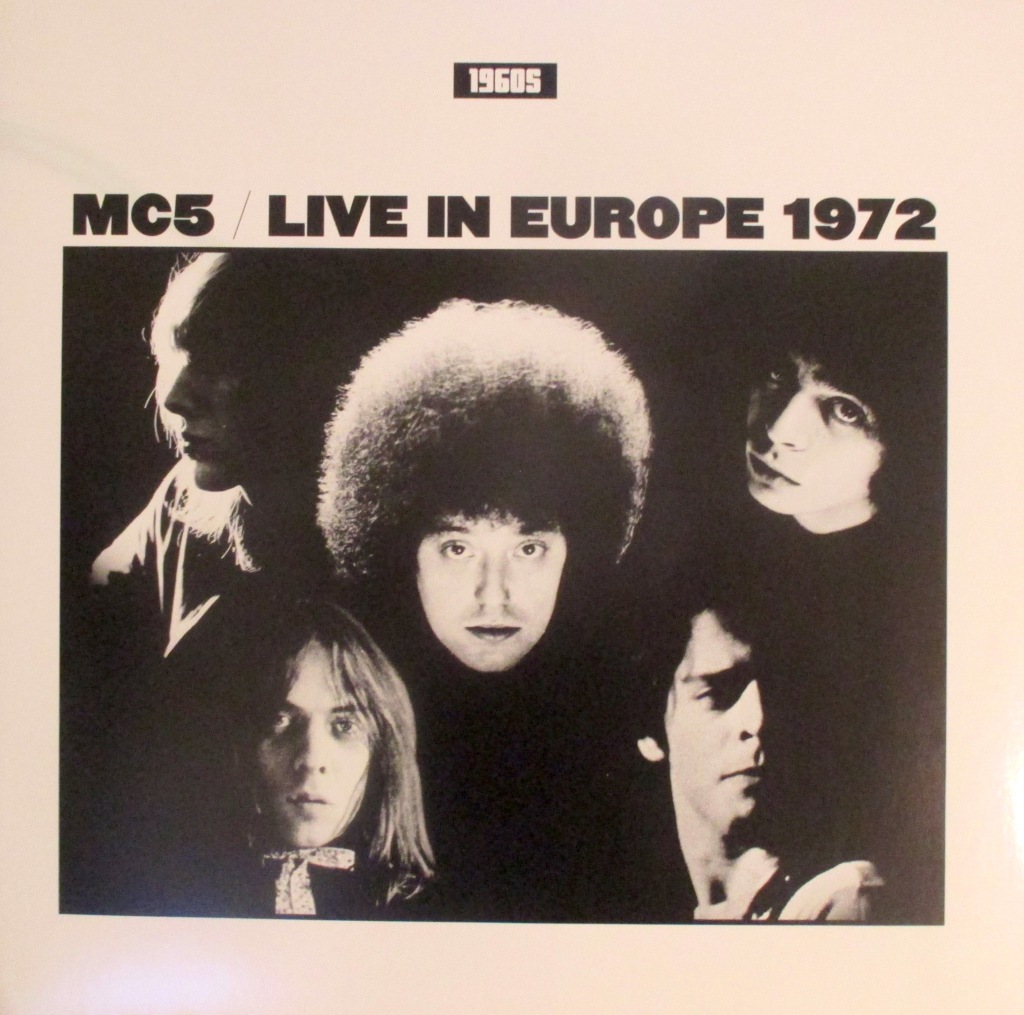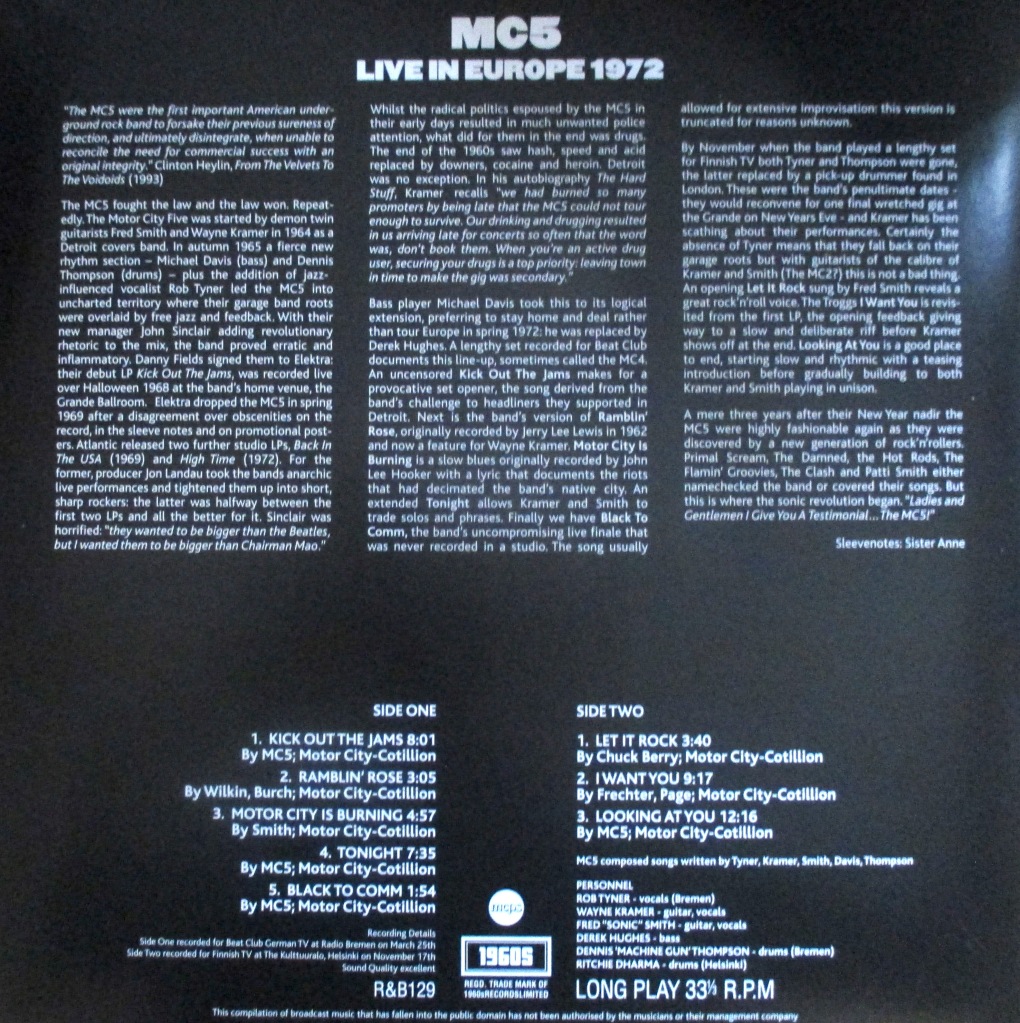New Vinyl LPs – Mott The Hoople and MC5
Order now from http://www.1960s.london

Mott The Hoople
TV and Radio 1970 – 1971
Side One
- Thunderbuck Ram (Ralphs)
- Original Mixed-Up Kid (Hunter)
- Whisky Women (Ralphs)
- The Moon Upstairs (Hunter, Ralphs)
- Darkness, Darkness (Young)
- At The Crossroads ( Sahm)
- Keep A-Knockin’ (Penniman) /
- What’d I Say (Charles)
Side Two
- Like A Rolling Stone (Dylan)
- You Really Got Me (Davies)
- Angel Of Eighth Avenue (Hunter)
- Wrong Side Of The River (Ralphs)
- When My Mind’s Gone (Hunter)
Recording Details
Side One
Track 1 recorded for BBC radio Top Gear on February 3rd 1970 and transmitted on February 21st 1970
Tracks 2 & 3 recorded for BBC radio Sounds Of The Seventies on March 8th 1971 and transmitted on March 16th 1971
Tracks 4 & 5 recorded for BBC radio Sounds Of The Seventies onOctober 25th 1971 and transmitted on November 4th 1971
Track 6 recorded for Beat Club, ARD TV, Bremen and broadcast on March 28th 1970
Tracks 7 & 8 recorded for Get To Know, ABC TV, Australia and broadcast on January 20th 1971
Side Two
Track 1 recorded for BBC radio Top Gear on July 6th 1971 and transmitted on July 24th 1971
Track 2 recorded for Beat Club, ARD TV, Bremen and broadcast on March 28th 1970
Track 3 recorded for BBC radio Top Gear on July 6th 1971 and transmitted on July 24th 1971
Tracks 4 & 5 recorded for BBC Radio John Peel Sunday Concert on April 23rd 1970 and transmitted on 3rd May 1970
Personnel
Ian Hunter: vocals, piano
Mick Ralphs: guitar, vocals
Pete Overend Watts: bass
Dale “Buffin” Griffin: drums
Verden “Phally” Allen: organ
Sound Quality
All except the final two tracks are Very Good. The two Sunday Concert tracks are of lesser quality but still totally listenable.
Sleevenotes
“I’ll give you a little information about the band I’m mixed up in. Buffin is the baby of the band: he’s a drummer, a fucking great one. Mick Ralphs is your original loner. He’ll run for miles to escape friendship when it’s the one thing he needs. He’s totally committed to the group. Phally – a product of Wales, come from a tiny village outside Swansea. When he’s down, he’s down, when he’s up he’s within reason. Pete still gets to rehearsals two hours late and we have them a quarter of a mile from his place in Hampstead. He’s solid as a rock – when I think of Pete I think of kindness, gentleness, eccentricity – a complete upper in every way.”
Ian Hunter, Diary Of A Rock’n’Roll Star
The period 1970 – 71 found Mott The Hoople playing innumerable live gigs, pausing only to record three well-received LPs for Island Records. The performances here document the band’s live set, featuring several songs not released on the band’s studio LPs plus some deep cuts only rarely performed live.
Thunderbuck Ram provides a suitably raunchy beginning. According to Pete Watts “It was a song with no title. We found the name scrawled on a toilet wall in the Pied Bull, our rehearsal base in Islington and it seemed perfect for the track. I think it was the name of a group.” This version is largely instrumental and the band manage the quiet / loud transitions with precision, Allen’s organ duetting with Ralphs’ guitar. Original Mixed-Up Kid features the band’s sensitive side and includes a quote from Byron. Ralphs is back in charge for Whiskey Woman, a tale of loose women encountered backstage at the Whiskey A Go Go in Los Angeles. The Moon Upstairs was a punk precursor, a fast-paced rocker opening with chopped guitar chords and featuring the lyric “We’re not leading you, we’re bleeding you but you’re too fucking slow”. In deference to delicate BBC sensibilities, Hunter swallows the f-word. Darkness, Darkness was written by Jesse Colin Young for The Youngbloods and is another Ralphs showcase. At The Crossroads was originally written by Doug Sahm for The Sir Douglas Quintet and is performed here for German TV Beat Club. It shows the band at their hairiest. Classic rockers like Keep-A Knockin’ (Little Richard) and What’d I Say(Ray Charles) frequently closed Mott sets: the frantic versions here were recorded for Australian TV.
Like A Rolling Stone was never recorded for a studio LP. It was the number with which Hunter auditioned to join promising Hereford group Silence, thus creating Mott The Hoople. At nine minutes it is also one of the longest tracks the band recorded but featured only briefly in the Mott live set. Uber-Dylan fan Hunter is in his element here with Allen doing his best Al Kooper. Back to Beat Club for a rampaging instrumental take on the Kinks’ You Really Got Me with a guitar/drums/organ rave-up to finish. Angel Of Eighth Avenue served notice that Hunter could write sensitive ballads as well as raucous rockers. We finish with two rare performances, both taken from the May 1970 John Peel Sunday Concert. Wrong Side Of The River was a mournful Mick Ralphs tune steeped in Americana and Allen’s Hammond organ. When My Mind’s Gone was an intense psychodrama from the Mad Shadows LP which Hunter said that he wrote spontaneously whilst hypnotised by mentor Guy Stevens (sleeve credit “spiritual percussion and psychic piano”).
Pete Frame once claimed that on a good night Mott The Hoople were the best live band in the UK, and there is plenty of evidence here to support that claim. The problem was that they weren’t selling any records. “You were selling out the biggest venues in the land and you weren’t having any record success,” said Hunter. “That’s not going to work for long. You have to have the record success to go with it.”
That record success would come with the gift of All The Young Dudes from David Bowie, as we shall see…
Sleevenotes: Doc Thomas


Live In Europe 1972
The MC5
Side One
- Kick Out The Jams (Tyner, Kramer, Smith, Davis, Thompson)
- Ramblin’ Rose (Wilkin, Burch)
- Motor City Is Burning (Smith)
- Tonight (Tyner, Kramer, Smith, Davis, Thompson)
Side Two
- Let It Rock (Berry)
- I Want You (Frechter, Page)
- Looking At You (Tyner, Kramer, Smith, Davis, Thompson)
Recording Details
Side One recorded for Beat Club German TV at Radio Bremen on March 25th
Side Two recorded for Finnish TV at The Kulttuuralo, Helsinki on November 17th
Personnel
Wayne Kramer – guitar, vocals
Fred “Sonic” Smith – guitar, vocals
Derek Hughes – bass
Rob Tyner – vocals (Side One
Dennis ‘Machine Gun” Thompson – drums (Side One)
Ritchie Dharma – drums (Side Two)
Sleevenotes
“The MC5 were the first important American underground rock band to forsake their previous sureness of direction, and ultimately disintegrate, when unable to reconcile the need for commercial success with an original integrity.”Clinton Heylin, From The Velvets To The Voidoids (1993)
The MC5 fought the law and the law won. Repeatedly. The Motor City Five was started by demon twin guitarists Smith and Kramer in 1964 as a Detroit covers band. In autumn 1965 a fierce new rhythm section – Michael Davis (bass) and Dennis Thompson (drums) – plus the addition of jazz-influenced vocalist Rob Tyner lead the MC5 into uncharted territory where their garage band roots were overlaid by free jazz and feedback. With their new manager John Sinclair adding revolutionary rhetoric to the mix the band proved erratic and inflammatory. Danny Fields signed them to Elektra: their debut LP Kick Out The Jams, was recorded live over Halloween 1968 at the bands home venue, the Grande Ballroom. Elektra dropped the MC5 in spring 1969 after a disagreement over obscenities on the record, in the sleeve notes and on promotional posters. Atlantic released two further studio LPs, Back In The USA (1969) and High Time (1972). For the former producer Jon Landau took the bands anarchic live performances and tightened them up into short, sharp rockers: the latter was halfway between the first two LPs and all the better for it. Sinclair was horrified: “they wanted to be bigger than the Beatles, but I wanted them to be bigger than Chairman Mao.”
Whilst the radical politics espoused by the MC5 in their early days resulted in much unwanted police attention what did for them in the end was drugs. The end of the 1960s saw hash, speed and acid replaced by downers, cocaine and heroin. Detroit was no exception. In his autobiography The Hard Stuff,Kramer recalls “we had burned so many promoters by being late that the MC5 could not tour enough to survive. Our drinking and drugging resulted in us arriving late for concerts so often that the word was, don’t book them. When you’re an active drug user, securing your drugs is a top priority: leaving town in time to make the gig was secondary.“
Bass player Michael Davis took this to its logical extension , preferring to stay home and deal rather than tour Europe in spring 1972: he was replaced by Derek Hughes. A lengthy set recorded for Beat Club documents this line-up, sometimes called the MC4. An uncensored Kick Out The Jams makes for a provocative set opener, the song derived from the band’s challenge to headliners they supported in Detroit. Next is the band’s version of Ramblin’ Rose, originally recorded by Jerry Lee Lewis in 1962 and now a feature for Wayne Kramer. Motor City Is Burning is a slow blues originally recorded by John Lee Hooker with a lyric that documents the riots that had decimated the band’s native city. Finally an extended Tonight allows Kramer and Smith to trade solos and phrases.
By November when the band played a lengthy set for Finnish TV both Tyner and Thompson were gone, the latter replaced by a pick-up drummer found in London. These were the band’s penultimate dates – they would reconvene for one final wretched gig at the Grande on New Years Eve – and Kramer has been scathing about their performances. Certainly the absence of Tyner means that they fall back on their garage roots but with guitarists of the calibre of Kramer and Smith (The MC2?) this is not a bad thing. An opening Let It Rock sung by Fred Smith reveals a great rock’n’roll voice. The Troggs I Want You is revisited from the first LP, the opening feedback giving way to a slow and deliberate riff before Kramer shows off at the end. Looking At You is a good place to end, starting slow and rhythmic with a teasing introduction before gradually building to both Kramer and Smith playing in unison.
A mere three years after their New Year nadir the MC5 were highly fashionable again as they were discovered by a new generation of rock’n’rollers. Primal Scream, The Damned, the Hot Rods, The Flamin’ Groovies, The Clash and Patti Smith either namechecked the band or covered their songs. But this is where the sonic revolution began. “Ladies and Gentlemen I Give You A Testimonial…The MC5!”
Sleevenotes: Sister Anne

